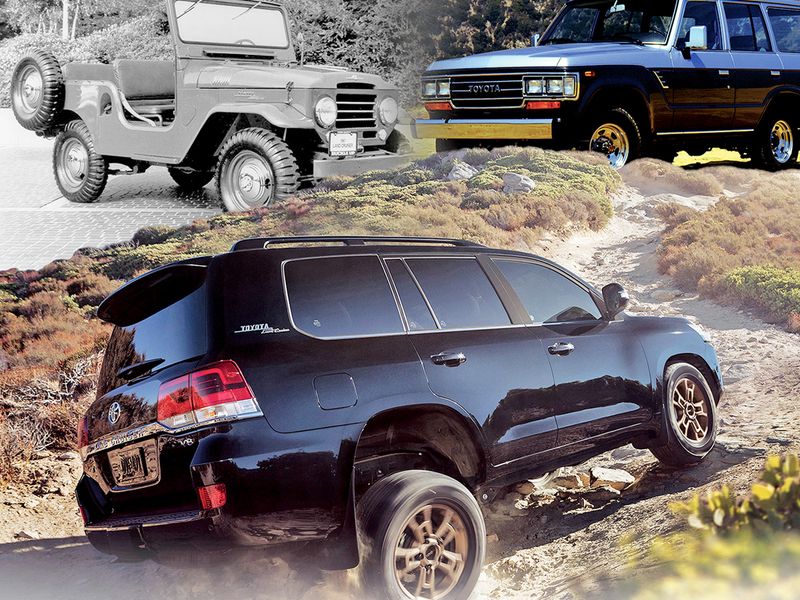
The Toyota Land Cruiser — a global icon for off-roading enthusiasts with a lineage that stretches back to postwar Japan and a small but dedicated customer base — will end its 63-year run in the U.S. after the current model year.
But that doesn’t mean the automaker is ceding the luxury large-SUV space. It’s just that whatever the Land Cruiser’s spiritual successor ends up being, there’s a decent chance it’s going to crawl and climb with a Lexus badge on its grille.
“The Toyota Land Cruiser has been a legendary name for more than 60 years,” Toyota Motor North America said in a statement. “While it will be discontinued in the United States after the 2021 model year, we remain committed to the large-SUV segment and will continue to explore future products that celebrate the Land Cruiser’s rich off-road history. We encourage loyal enthusiasts and intrepid adventurers to stay tuned for future developments.”
The Land Cruiser — developed in Japan in 1951 as a localized answer to the Willys Jeep — is Toyota’s longest-running model line and is inexorably tied to Toyota since its very first days in the U.S. According to Toyota, in its first year in the U.S. in 1958, the company sold 288 Toyota Toyopet sedans and exactly one Land Cruiser.
Sales have ebbed and flowed in the intervening decades in the U.S. as other rugged overlanders have proliferated. The $86,880 starting price (including shipping) of the two- or three-row body-on-frame SUV also is higher than that of many competitors. Still, the Land Cruiser, imported from Japan, retains a global following as well as a consistent U.S. sales record. Over the past 15 years in the U.S., dealers have sold an average of 2,979 Land Cruisers per year, with a high of 3,801 in 2008 and a low of 1,662 in 2011. In 2020, Toyota sold 3,147 Land Cruisers.
Jack Hollis, head of automotive operations at Toyota Motor North America, told Automotive News last month that the sudden popularity in off-road adventuring brought on, in part, by the pandemic has every brand staring off the pavement for opportunities.
“What we have seen at Toyota is that there’s so much of an appetite for [off-roading] that I see that [moving into] the Lexus brand as well,” Hollis said. “There is an appetite, a customer desire, a customer push to see all brands giving them more options. I think it would be silly for Lexus not to travel down that path.”
Hollis said there is “white space” in Lexus’ lineup for a Land Cruiser-like vehicle, something Lexus dealers have wanted for a while. “I think that people are seeing luxury through new lenses, and I think Lexus has got to continue to grow and look into those open spaces.”
While Lexus already has the LX, which shares an aging platform with the Land Cruiser and outsells the Toyota version, brand head Andrew Gilleland said that when it comes to the great outdoors, there is more room to grow.
“We have body-on-frame vehicles that would lend themselves to that type of execution, if we decide to go that way,” said Gilleland, who took over the helm at the Lexus brand last year. “You know, for me personally, I’m an outdoorsman. I would love to see us do it. I think it’s a viable business model.”
Gilleland said consumer excitement — and the accompanying deposits — that surrounded the launch of the Ford Bronco last year was a wake-up call.
“Holy cow! They sold out that thing, and I think there’s a strong market out there for authentic off-road chops and credibility. We’re seeing that with [the Toyota] 4Runner as well. I don’t think it’s any secret that [the 4Runner] is not all that new, but it continues to set records and it continues to grow volume,” Gilleland said.
While he wouldn’t say specifically what the Lexus brand’s plans were, Gilleland did say that “there’s still a thirst out there for body-on-frame and authentic off-road [capability], so it’s something we’re exploring.”